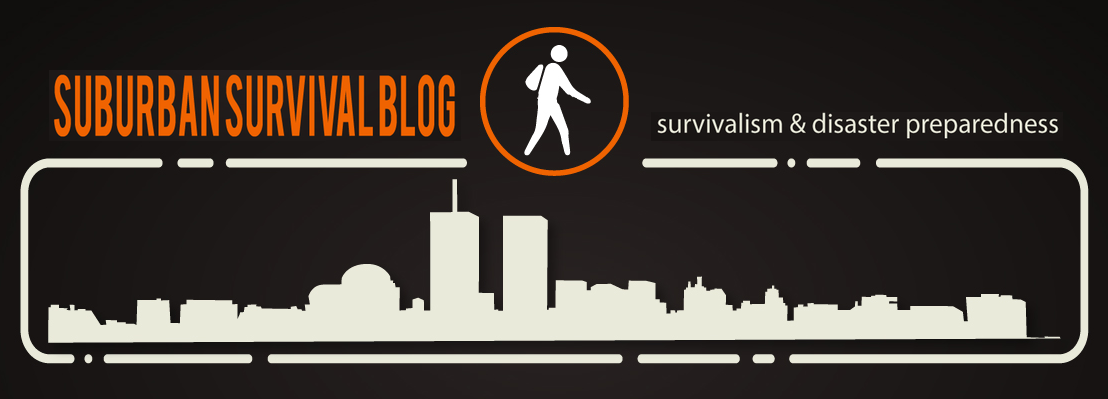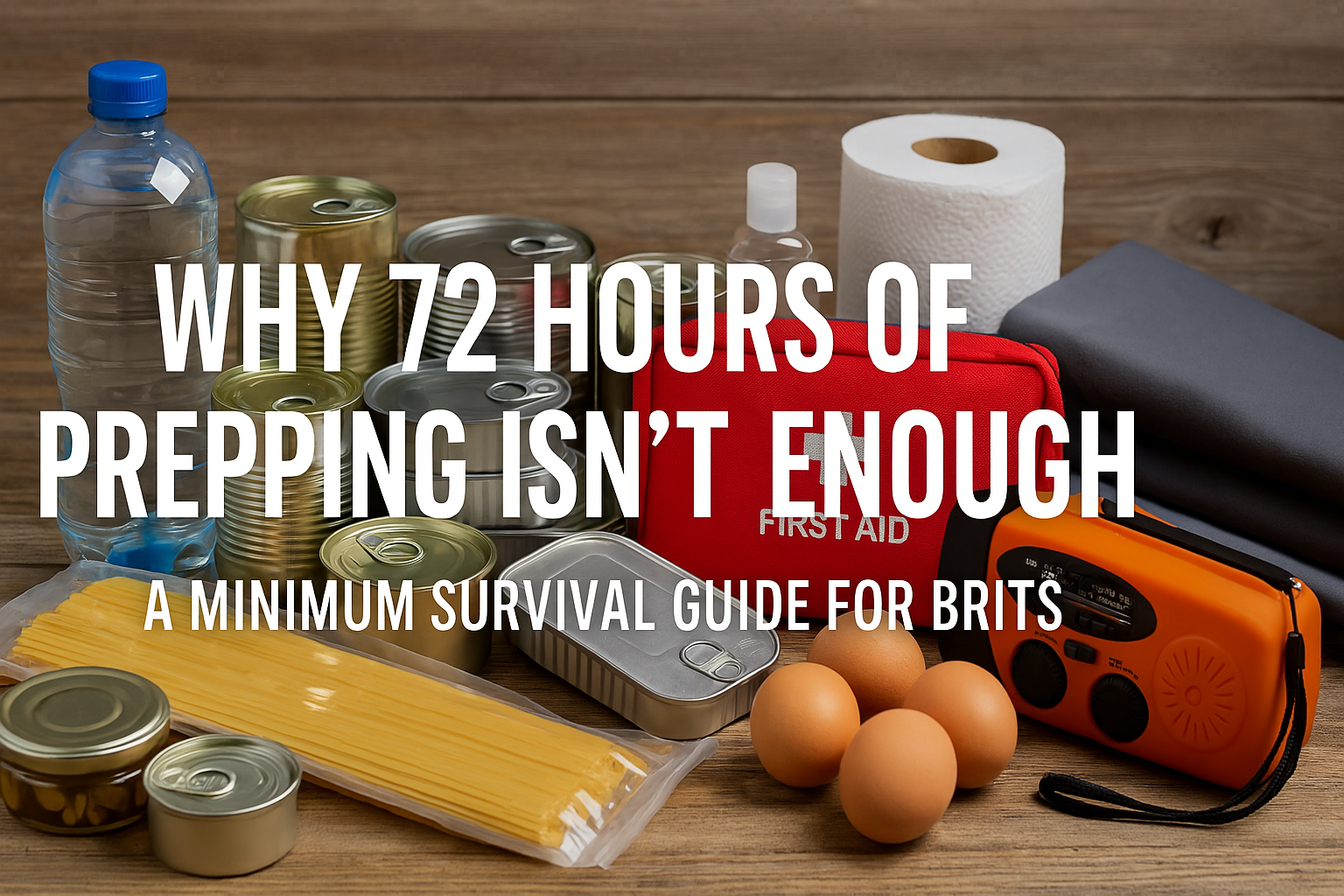 Everyone has money on the brain these days. I don’t care how much money you have. A forum I am sometimes active on had one young man in college just sought the advice of the members on how he can get prepared, as well as help his family and his girlfriend prepare for any tough times ahead. All this despite the fact that his girlfriend and his family thinks he is off his rocker. Many people are more aware that they need to prepare for tougher times ahead. The same gentleman I am talking about makes minimum wage in a part time job while going to school… He is preparing Bug Out Bags for everyone, and while I think a good Bug Out Bag is essential whether you think you need it or not, there are other areas I think this person should be focusing on first. But that is just my opinion. Maybe more on that later.
Everyone has money on the brain these days. I don’t care how much money you have. A forum I am sometimes active on had one young man in college just sought the advice of the members on how he can get prepared, as well as help his family and his girlfriend prepare for any tough times ahead. All this despite the fact that his girlfriend and his family thinks he is off his rocker. Many people are more aware that they need to prepare for tougher times ahead. The same gentleman I am talking about makes minimum wage in a part time job while going to school… He is preparing Bug Out Bags for everyone, and while I think a good Bug Out Bag is essential whether you think you need it or not, there are other areas I think this person should be focusing on first. But that is just my opinion. Maybe more on that later.
After looking at some of my old posts about bugging in and bugging out, and knowing I am re-evaluating my mindset of bugging out, thanks to the input of several of my readers, I think there are other areas than the Bug Out Bag that could and should be focused on first.
Let’s examine this. Regarding food storage or “extra food in the house” one of the simplest ways I would recommend anyone start getting prepared is this area is to just buy a little more every time you go shopping. Food prices are going up, and by buying jut a little bit more now, not only helps prepare you for the future if there is some type of personal, natural, or man made disaster, it also helps to save you money, even if you are buying before prices rise. If you normally buy four cans of tuna a week on sale for $5.00 buy eight cans instead or four. You have only increased your weekly bill by five dollars, but you have gained four or more meals out of it that are now in your food storage. The adage of “buy what you store, and store what you eat.” makes perfect sense here. Also, begin putting a system together for replacing the food that you do eat. If you eat a can of tuna, buy two more the following week. One you have replaced the can you have used, and two, you have added another can to food storage giving you that additional meal. I put up a post some time ago on five dollar preps that you can make weekly that hopefully won’t break the bank. The rotation concept I learned from a Ron Hood video Urban Master One, The Home.
By doing just a little at a time, based on your budget, you will not be over extending yourself. You will be slowly, yet more rapidly than you know, be achieving a preparedness goal. One thing you will have to do, however, is figure out how much food you want to have stored. One month, three months, six months, a year? Even I do not have a year’s worth of food stored (about three months), and I am not sure where I would store it in my apartment if I did have it. I just do not have the space. I do think, however, that by smartly managing my space as discussed in my post, Apartment Prepping, the Real Deal, in My Opinion.
One of the other advantages of doing a little at a time instead of buying everything at once is that you also get to learn what you really eat. You might think you want to store 200 cans of SPAM, but are you really going to eat it? By giving yourself a month or two of rotation, and by slowly supplementing with items such as white rice, legumes, etc. you will be filling in gaps for protein, vitamins, minerals, etc. If you go out and buy everything all at once, I can almost guarantee you that you will buy quite a few items you will never use, eat, or drink, and you will be wasting a lot of money that you did not have to spend to begin with.
I started by storing a few cans of tuna, canned chicken, a one pound bag of rice, etc. week over week. In fact, I just pulled a can of chicken out to make chicken salad today. I will be replacing that with two cans early in the week.
Now. All of the above being said, it is no good without water. You may want to first focus on water storage. Why? Well, first of all, I don’t care if you are in the arctic or in Australia, you need water. Water storage can be inexpensive, and you can get it done rather quickly. It can sit in a closet for a year, and you don’t have to touch it unless there is an emergency. They say a gallon of water a day per person. Find some water containers that can hold five gallons of water such as the ones in the link, fill it up with tap water, add 1/2 tea spoon of Clorox unscented bleach, put the cap on, place it in the closet (it’s good for ab0ut a year at that point). Warning, do not put it on a concrete floor. Something about the water going bad because it is on the concrete… Not sure how true this is, maybe someone else could shed some light. My point, though, is that the prepping does not have to be expensive up front…
This brings me to budgeting. You should have a written budget or a budget in excel which will allow you to see all your expenses, income(s) if you have more than one, and you will be able to see how much money you will have to make your purchases for storage. In fact, I have a spreadsheet that I have used in the past, and continue to use that I will post for you to download for your own use and to modify how you see fit. I will do this over the weekend for you. I am not going to get into a lecture here about budgeting. I am not your spouse or your mom. I have enough trouble taking care of myself, I don’t need to be preaching to you about your money. There are enough people in the world to do that already.
Before I move away from money, however, I do want to touch on building an emergency slush fund. I am not talking about a savings account, but a slush fund of cash that you can have on hand if the power goes out in your town, etc. Without power, there are no ATM transactions, and the bank stops doing business until power is restored. In a short term emergency situation, cash can be king. I recommended building a cash on hand fund that you keep in a safe place for emergencies of about $1,000.00. It may take some time to build, but once it is built, you can be confident that a 1,000.00 can discreetly buy you additional supplies, get you a motel room in a neighboring town, etc. for a day or two until you can return home. Only use it for emergency situations. If your car is in need of a repair and you don’t have the cash in your bank, then use the emergency money. But, if you use it, replace it so there are no surprises when you need to grab it for the next emergency… I know it may be tough to put $1,000.00 aside. You may have to budget for it, sell some stuff, take your tax return and put that money aside, whatever. Just try to do it. Historically, most of the emergencies that have crept up on me have totaled less than $1000.00.
From a Bug In preparation standpoint, you should think of what situations might apply to your geography and demographic. Bugging in requires some thought based on the situation at hand. If there is civil unrest, and you decide to bug in, you should think about the consequences of that vs. bugging out. If you live in a snow belt, preparations around fuel and staying warm may be more important to you. If you live in Arizona, then maybe it is water storage that is your main priority. Whatever the situation, take your time, and put on paper all the possible scenarios, including situations such as it is 3:00 a.m. and there is a fire in your home, or a flood in the basement. Once you have done that you can revisit each scenario and what gear you will require for it. You can then discuss or think about the feasibility of each situation and decide which items of gear to procure first. I would give this consideration before the consideration of bugging out. Why, because these are real scenarios that can happen now, or at least several of them, and they may pose a life threatening situation to you and/or your family so you may want to deal with them first. This thought process is a departure from earlier posts on Bugging Out that I have written. Because I live in the suburbs, and deem most situations as potentially life threatening I have been a proponent of bugging out. After much discussion with others here on this blog and in my preparedness meetup group, I find that there are situations where bugging in is a valid option and concern to people. It seems to come up more often when someone has a family with small children or elderly family members that just are not as mobile as they are. Which, of course makes complete sense, because, hey, your five year old son or daughter probably has a short attention span, gets tired quickly, etc. Similarly, an aging family member may not be as mobile, have a health condition, etc. preventing you from going mobile. One area, that I am giving thought to recently is my own age. I am 41, almost 42. As I get older, I personally will not be as mobile. I have to consider that. What if I break a leg, arm, etc. and am in a cast. How mobile will I be? Not so much, I assume… So Bugging In is an area I would focus on before bugging out.
Bugging Out generally requires gear. Gear that as guys, and sometimes gals, we jump at buying because it is “stuff we think we need.” I was guilty of this in the beginning… I had to have the “BIG” first aid kit, the this, the that, the stuff… I spent a lot of money. Too much money. I bought gear I may never use. I have given some away. Some of it has been stolen, leaving me without about $400.00 in gear. Did I really “need” it. I replaced it with spare gear I had around my apartment, so guess what, I don’t think I really needed it. Be wary of the “gear bug” because when it bites, it bites hard, and leaves your wallet empty. Instead pick up a couple of good books on survival skills, practice them, and then think about the gear you need. Here is why; the more you know, the less you need in the field. It’s true. It’s great to have seven ways to start a fire, but if you have the knowledge to do it without a lighter, matches, magnesium, fire steel, etc. you really don’t NEED them, do you. You will be more comfortable without them. I read in a recent article, it took Les Stroud three months of practicing every day with a bow drill before he could make fire consistently ‘almost’ every time. That is 90 days of practice. Every day. But once he had it down, he didn’t need the match. Buy yourself a book on building a survival kit like “Build the Perfect Survival Kit” by John D. McCann, or Dave Canterbury’s “Survivability for the Common Man.” Both of these books outline methods of building a kit that suits your needs without going crazy. As for Bugging Out, you also need to make sure you have a place to go. There are a lot of resources online for bugging out. Two of which I reccomend are Scott William’s book “Bug Out The Complete Plan for Escaping Catastrophic Disaster Before it’s Too Late,” and the following resources:
- http://suburbansurvivalblog.com/tag/bugging-out
- http://suburbansurvivalblog.com/tag/bug-out-location
- http://suburbansurvivalblog.com/tag/bug-out-bag
- The Survival Podcast: Bugging Out Keyword Search
There are literally thousands of resources online talking about bugging out. Just make sure you are able to do it, if you are going to do it. My Bug Out Bag is set up for a 10 day trek on foot (worst case scenario) to my bug out location. However, While I am in average shape, and even if I were in excellent shape, I would still DREAD the 10 day trek with a pack on my back on foot in the mountains of NJ and PA across the Delaware River, and who knows how many other countless streams rivers, rocky terrains, etc. I would have to go. Just be prepared to do it if you have to, and know that it may be painful…
I have gotten a little off topic. To reiterate, the more you know, or rather, the more skills you are proficient in, the less gear you may have to bring with you. So think about that as you learn and practice your skills, and build your Bug Out Bag. It could save you hundreds of dollars or more in the long run…
So, now that you have several lists, your budget, etc., you should sit down and put a list together of all the equipment, gear, etc, that you need to procure to become more prepared for whatever emergencies you have identified for yourself. If you plan on buying online, make sure you calculate the shipping costs, etc. This will help you determine your real costs of buying that product. i.e. if a Ka-Bar knife costs $59.95 online plus shipping of $8.50, your loaded cost on that knife is $68.45, not the $59.95 that they are selling it to you for. What are some of the other products that are associated with the knife that you may need to buy. Well, you need to buy a sharpening stone or sharpener, that is an additional expense. Maybe you want to upgrade to a Kydex sheath. There is another $15.00 approximately. By the time you are done accessorizing your $59.95 knife you may have spent $100.00 on it. Once you do this, you will have a realistic idea of what you will have to “invest” in your future of prepping and being a prepper. It has taken me some time to procure the items I believe I will require, and more obviously from the above statement you already read about spending too much. However, learn from my mistakes. Do not spend where you do not have to. I did not put the prices together before I bought… I just bought, and I urge you to identify the costs first. You may find you can get away with a lesser cost item than the one you are looking at that may perform exactly the way the more expensive one does.
Good luck, and please feel free to comment…









Great post. (I say that all the time here!) You could probably publish your own book soon based on all the good stuff you’ve written!
I agree with much of what you said, and I think the slow-but-steady accumulation process, coupled with a rotation plan works great. (This post actually reminded me to rotate my own water supply and get it off of the basement floor — thanks!)
For my emergency $$$ supply, I do that in small amounts too. Hide away a $10 or a $20 once a week and it adds up over time. I think its a good idea to have smaller bills too because it might be hard to break a $100 at many places or with neighbors if the power has been out for more than a day or two.
First, I agree with the smaller bills in the emergency fund. I personally think you should have singles, fives, tens, and 20’s with several rolls of coins, preferably quarters.
Second, thanks for the props about the content, and yes a book is slowly forming here, and I plan on adding to much of the content and either searching for a publisher or self publishing. Not sure yet, and there are still a ton of topics to write about.
Getting your family on board with preparing is probably the toughest thing. Preparing can’tbe just one persons’ task or ‘hobby’ if for no ther reason than everyone needs to know what is stored, where it is, and how to use it.